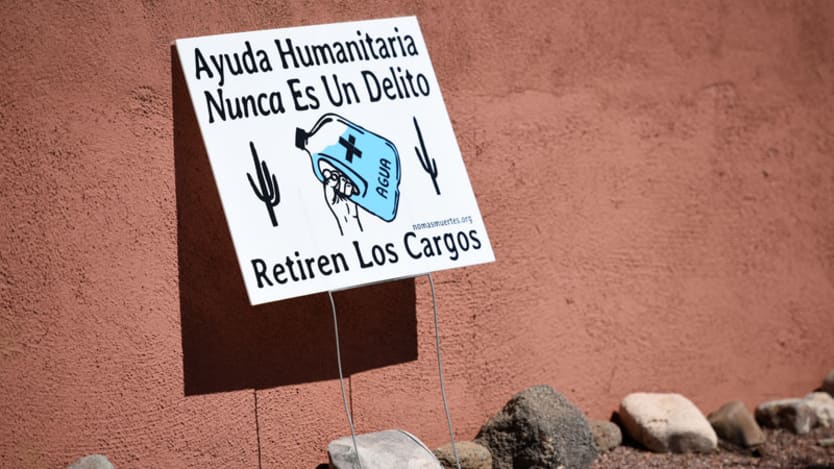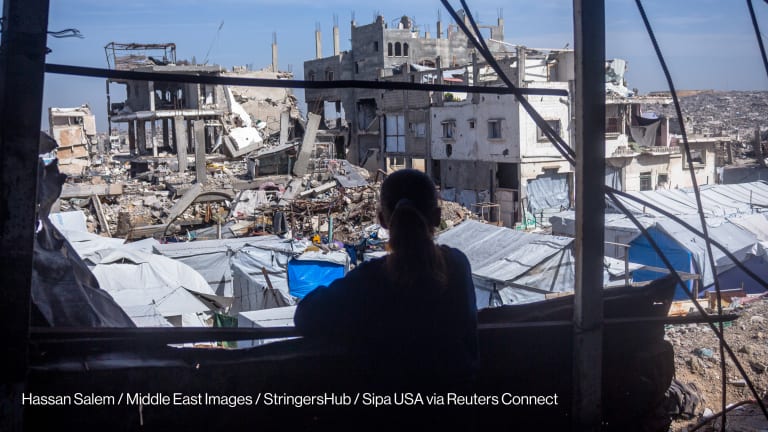Opinion: Government attacks on humanitarian organizations and human rights rising

A respected international humanitarian organization is heftily fined, has its assets frozen, its rescue vessel impounded, and its staff investigated for human trafficking by the Italian government. Its crime: saving refugees from drowning in the Mediterranean Sea.
A group of humanitarian volunteers is charged, tried, and convicted in the United States. Its crime: leaving water supplies for asylum-seekers and migrants crossing the deadly desert on the Mexico/U.S. border.
These are but two shocking examples of an alarming and growing trend of attacks by governments on organizations providing humanitarian assistance to migrants, refugees, and other excluded groups globally. This trend, lamentably, is part of an increasing pattern of assaults on the rights of vulnerable people exercising their legitimate right to seek refuge from conflict and repression.
On the state of migration and refugees
► Italy's asylum reception system crumbles
Fundamental values that lie behind humanitarian response are under attack in a way unparalleled since World War II. Civil society, acting on humanitarian impulses, confronts a rising tide of global mean-spiritedness, a public compassion deficit.
This and other trends that have impacted on civil society in the past year are presented in the newly released "2019 State of Civil Society Report." The report, by global civil society alliance, CIVICUS, paints a terrifying picture: civic space — the space for civil society — is under serious attack in 111 of the world’s countries — well over half of the world. A meager 4% of the world’s population live in countries where our fundamental civic freedoms — of association, peaceful assembly, and expression — are respected.
There are now serious restrictions in civic space on every continent, but yet even as they grab more power, we find the world’s leaders are apparently incapable of responding to the great challenges of the day. They are failing to fight overwhelming inequality, remaining silent on the human rights abuses of states such as Saudi Arabia and Sudan, and letting down the people of Syria and the Rohingya people of Myanmar, among many others.
From Brazil to India, deeply divisive political agendas are seen to have gained national prominence by harnessing public anger toward fundamental economic and governance failures. The promise of anti-establishment change has helped authoritarian leaders win elections by joining groups of people together on the basis of what they oppose, but without tangible evidence of change that addresses the failures behind people’s anger.
The emergence of extremist groups that actively engage in attacking, intimidating, and silencing human rights defenders — often with explicit political endorsement — has heightened the challenge for civil society. These groups are increasingly confident, aggressive, and organized, and are actively crowding out legitimate civil society voices.
Borders and walls are being reinforced; and national sovereignty — narrowly understood as presidential sovereignty, rather than inclusive and democratic notions of sovereignty — is being reasserted and used as an excuse to override international agreements. The international system and multilateral ways of working are being rewritten by powerful states such as China, Russia, and the U.S., which refuse to play by the rules.
Yet despite these critical challenges, rights were claimed in the past year by human rights defenders who have persistently engaged to secure significant wins across the world — from landmark shifts on abortion rights in Ireland and LGBTQ rights in India to the courageous and coordinated regional efforts to support the those being uprooted from Venezuela.
In country after country, people were motivated by the rising costs of everyday living, the lack of decent jobs, poor public services, and housing, and the corruption and inequality they see daily, to rise up and challenge their exclusion. From the global #MeToo women’s rights movement to the March for Our Lives gun reform movement led by high school students in the U.S. to the growing school strike climate change movement, the power of collective action is being proven.
It is in this context that the “2019 State of Civil Society Report” provides opportunities for hope and improvement. It points us to the urgent need for new approaches to analyzing and combating the growing power of anti-rights groups. It calls for more extensive and better quality local democracy to provide spaces where people can tell their own stories, ask their own questions, and participate in the formation of new social movements.
We need stronger mechanisms to improve the state of democracy, including international standards to keep election periods free from misinformation and illicit interference. Newly elected governments must be pressed to uphold higher standards in civic space and democratic freedoms — and be taken to task for suppressing civic engagement.
Internationally, with our international institutions under assault, we need to make a new case for multilateralism as the only credible response to the major, transnational issues of the day. This calls for a strong endorsement of the spirit of internationalism and a renewed call to restate and protect the right to humanitarian action.
Quite simply, the quality of citizenship that future generations will be able to enjoy tomorrow depends on our ability to recast civil society as a progressive, rights-based arena today. While the rapid rise of the far right has become one of the great challenges in the modern history of civil society, the dynamism of our times suggests an opportunity to make new arguments that carry people over from negative coalitions into positive ones and help remake our societies. Indeed, the success stories and breakthroughs of 2018 suggest that we may already be turning the corner.
Search for articles
Most Read
- 1
- 2
- 3
- 4
- 5








